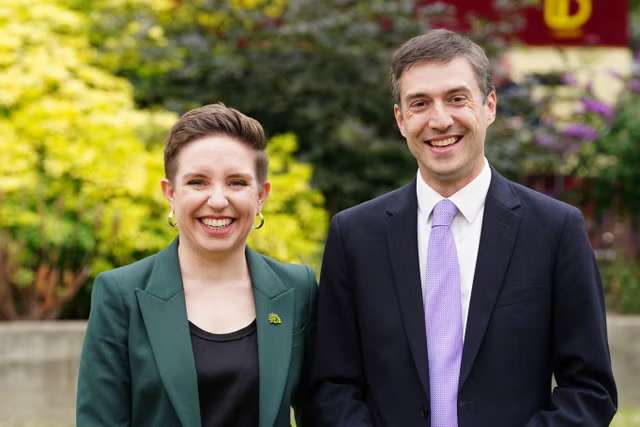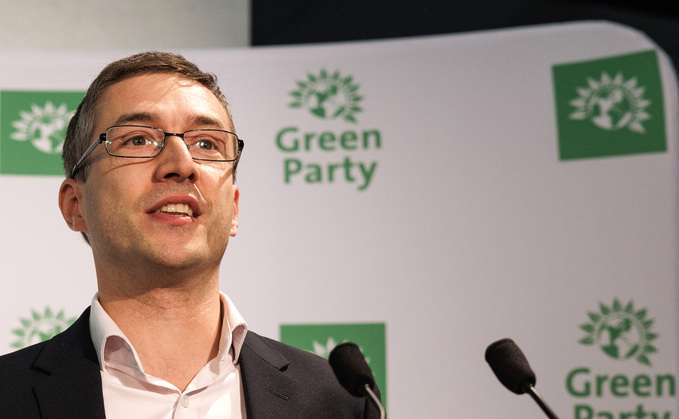Adrian Ramsay, the co-leader of the Green Party, has firmly defended himself amid a row sparked by the Labour government, which sought to portray him as a hypocrite in the ongoing debate over clean energy infrastructure.
Ahead of his party’s conference in Manchester, Ramsay addressed claims made by Prime Minister Sir Keir Starmer and others within Labour’s ranks.
The controversy centers on objections to the construction of new pylons in Ramsay’s Waveney constituency, which stretches along the Norfolk/Suffolk border in East Anglia. This 114-mile (184km) project aims to connect offshore wind farms to the South East and London, a move the Labour Party believes is crucial for transitioning the UK to clean energy.
Labour seized on Ramsay’s stance to argue that the Greens, often seen as champions of environmental causes, are obstructing the clean energy infrastructure necessary for Britain’s energy shift from carbon-based fuels to renewable sources like wind power.
Sir Keir described Ramsay’s opposition as “extraordinary,” suggesting it undermined the broader goal of achieving a greener energy grid.
In response, Ramsay fired back, arguing that Labour is more interested in taking the easy way out than exploring more effective solutions.
He claimed the government is pushing ahead with pylons simply because it is the simplest option available. However, he noted that there are alternative methods that haven’t been fully explored.
“The question you’re raising,” Ramsay explained, “is how to connect the new wind farms in the North Sea to London and the South East, where the energy is needed. There are various ways this could be done.”
He went on to criticize both the previous Conservative government and the current Labour administration for pushing ahead with a single option — erecting new pylons in East Anglia.
Ramsay argued for exploring other possibilities, such as building an offshore grid to route energy around the sea into London, or even burying the power lines underground, which could significantly reduce the environmental impact on local communities.
He noted that several European countries have already adopted these alternative methods.
“There has been no proper assessment of the options,” he added, “and this government just wants to press ahead with one.”

Cross-Party Support in East Anglia
Despite the accusations, Ramsay highlighted that his position is not an isolated one. He is working cross-party with MPs and local councils across East Anglia who share similar concerns about the environmental and social impact of the project.
But his criticisms of Labour extend beyond the pylons issue. Ramsay believes that the party is falling short on a number of environmental and social issues as the climate crisis worsens. “Labour’s approach isn’t ambitious enough,” he said.
“They’re focusing on decarbonizing electricity, which is the easy part. What about decarbonizing heating, reducing energy use in homes, or addressing our transport system?”
Adrian Ramsay
He also expressed disbelief at Labour’s decision to cut nature-friendly farming budgets, which, according to Ramsay, had only just begun to show positive results. This move has raised concerns among nature charities, some of which are now calling for that funding to be doubled.
Green Party’s Growing Influence
Ramsay’s frustration is not only rooted in policy differences but also in what he sees as Labour’s unease with the growing influence of the Green Party. Having quadrupled its number of seats in the last election and garnered nearly 7% of the vote, Ramsay believes the Greens have “broken the credibility barrier,” positioning themselves as a serious alternative on the left.
Ramsay closed the interview by addressing broader social issues, criticizing Labour’s recent decision to axe the winter fuel payment for pensioners, a move he described as unnecessary and damaging, particularly as energy costs rise.
With tensions between the two parties on the rise, Ramsay’s remarks have set the stage for a contentious Green Party conference and a growing battle over the future of the UK’s clean energy landscape.
READ ALSO: Speaker Bagbin Criticizes Committee’s Report on Songhor Salt Dispute



















